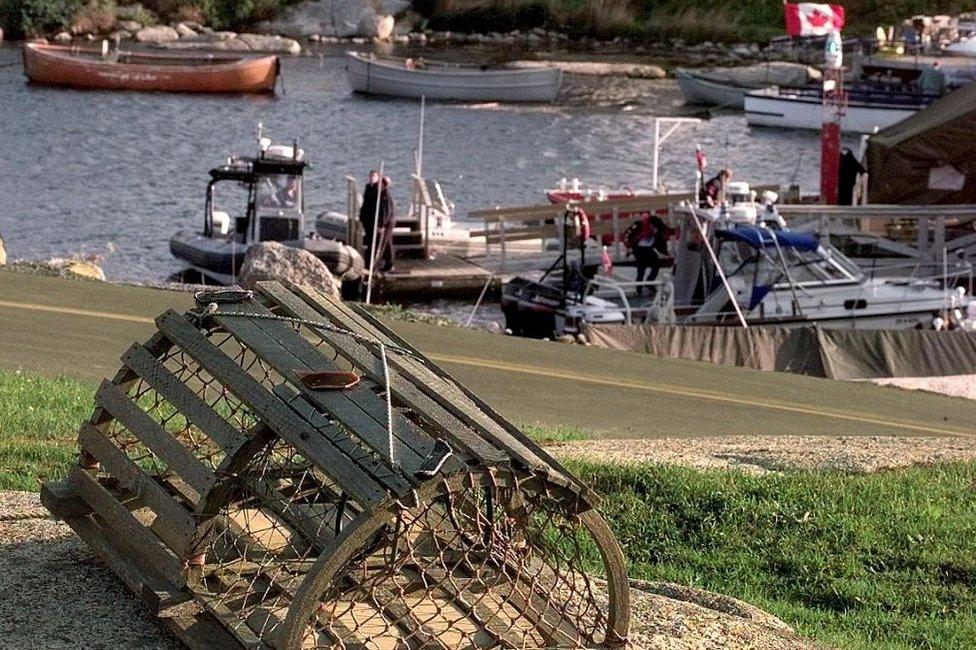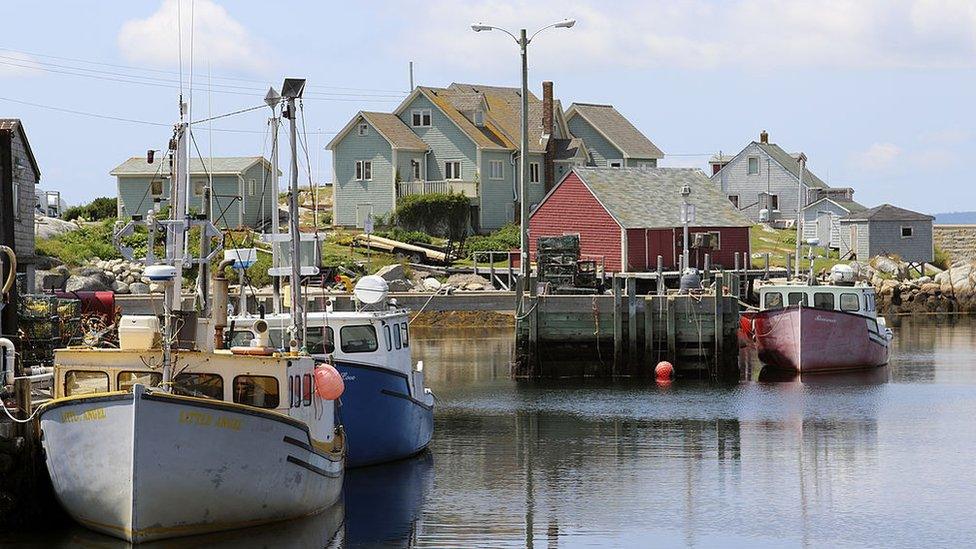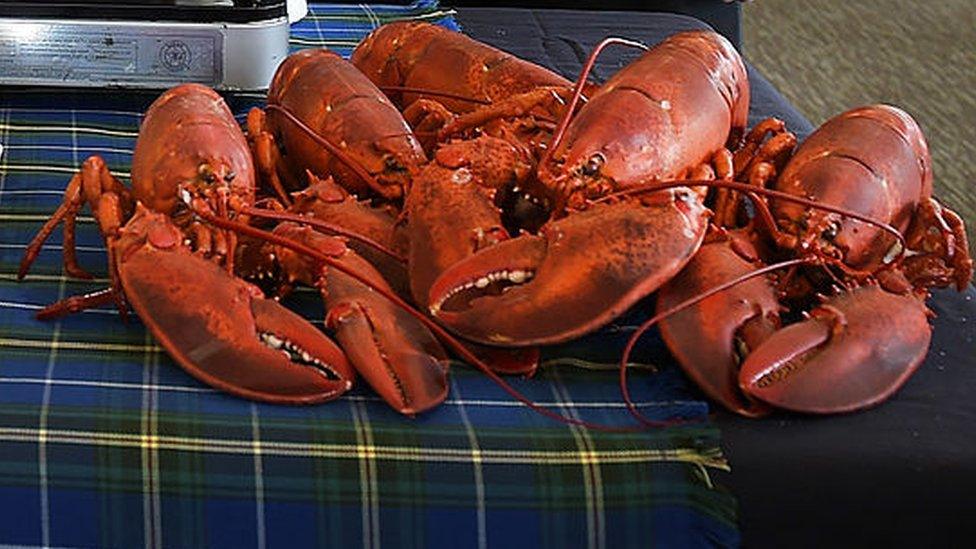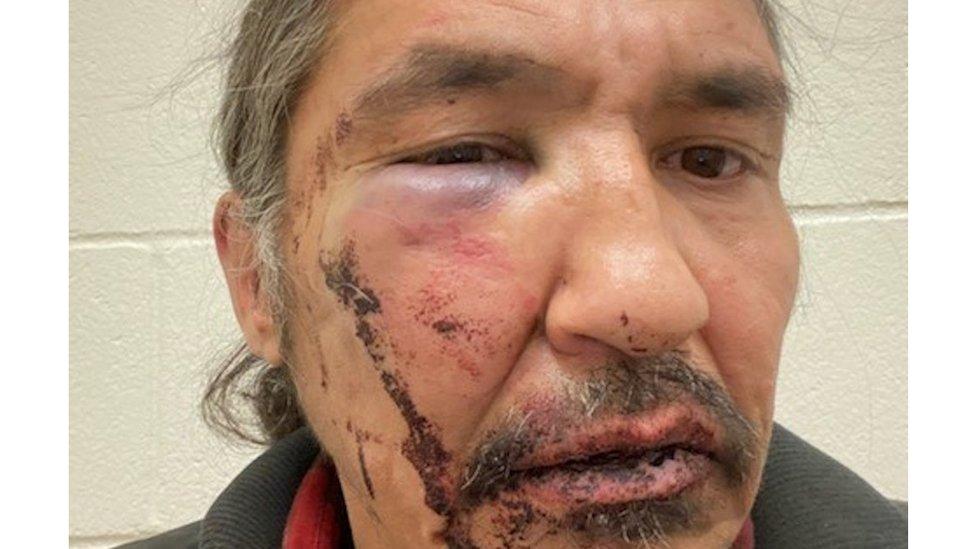Canadian police make arrests as tempers flare in lobster feud
- Published

Lobster is Nova Scotia's most valuable seafood export
Police in the Canadian province of Nova Scotia have made two arrests as tensions rise over a lobster fishery set up by the indigenous community.
Officers detained two people for assault as crowds gathered to mark the launch.
Members of the Sipekne'katik First Nation say they have a right to issue fishing licences to their own people.
Non-indigenous lobster fishers, however, say their boats are operating out of season and should be stopped.
The row comes on the anniversary of a ruling that affirmed the rights of indigenous groups to hunt and fish.
That 1999 ruling stipulated that any hunting and fishing should be for a moderate livelihood - but "moderate" remains largely undefined.
Lobster is Nova Scotia's most valuable seafood export and the associated fishing industry is worth an estimated C$500m (£293m) annually.
On Thursday, the Sipekne'katik First Nation issued the first licences under its new self-regulated "moderate livelihood" fishery in the harbour of Saulnierville. About 200 people gathered on the wharf to see the boats off and a ceremony took place to bless the fleet.
Sipekne'katik chief Michael Sack told the crowd that they were exercising their constitutional rights confirmed in the 1999 ruling.
"Our issue is not with the commercial fishermen, we have an issue with the levels of government not holding up our rights," he said, quoted by CTV. "The commercial fishermen should just back up and let us do our thing."

The government says it hopes to mediate between the two sides
As the launch of the new fishery took place, a flotilla of boats belonging to non-indigenous lobster fishers circled the mouth of the harbour in protest.
Indigenous fishers later said the lines to their lobster traps were cut and flares were fired towards their boats.
The Royal Canadian Mounted Police (RCMP) said on Friday that officers had been at the wharf, and at other locations nearby, to try to calm the situation.

Local media said tempers frayed among a large crowd gathered at the wharf in Weymouth, about 25km (15 miles) north of Saulnierville.
"We arrested two individuals at the wharf in Weymouth," RCMP spokesperson Jennifer Clarke Both said, quoted by broadcaster CBC. "They were arrested for assault and were escorted away from the scene and have since been released, pending court."
She said police would maintain a presence in the area over the weekend.

Lobsters from Nova Scotia are prized all over the world
On Friday, indigenous leaders declared a "state of emergency", external in response to the escalating tensions.
Non-indigenous lobster fishers are calling for the Canadian government to crack down on the new fishery. They say the law that stops lobster fishing for several months is vital for conservation purposes.
They also allege that the indigenous fishery is in fact a commercial operation that removes large numbers of lobsters - although First Nation leaders strongly dispute this.
Canadian Fisheries Minister Bernadette Jordan told CBC Nova Scotia News that she wanted to meet representatives from both sides of the dispute to discuss "the best path forward".
She said she was confident that both sides would come to the table for the sake of safety.
"We need to find a place where we can foster good conversation and make sure that we can all listen to each other and not talk at each other. We need to listen to each other and find out how we can best solve this situation," she added.
In recent years Canada has grappled with a series of issues involving the rights of indigenous people.
Prime Minister Justin Trudeau and his Liberal party came to power promising to transform the country's relationship with indigenous communities.
Indigenous people in Canada have rights that include the right to land, to self-determination and self-government, and to practise their culture and customs.
There are more than 1.6m indigenous people in Canada, which includes First Nations, Inuit, and Metis, and they make up about 5% of the national population.
- Published13 June 2020

- Published8 October 2017
